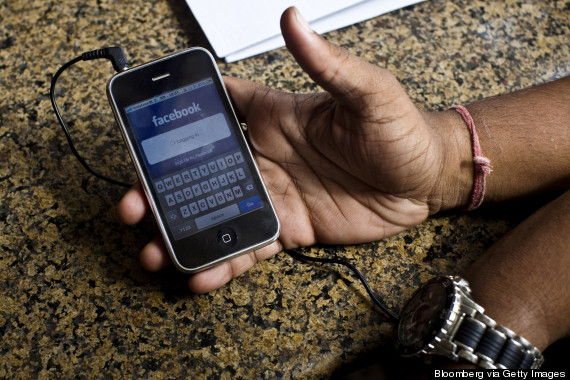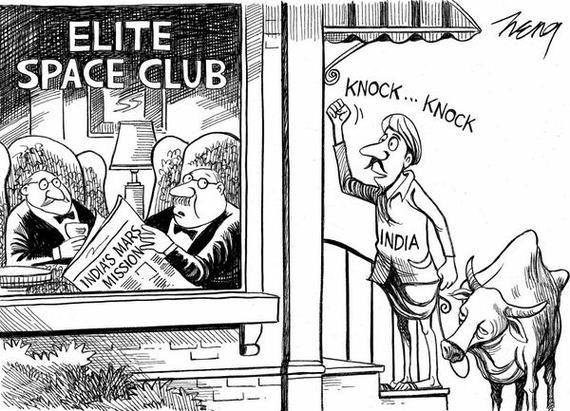
Two months ago, the New York Times Facebook page drew a spate of angry comments mostly in Malayalam, the language spoken in the southernmost state of India. What led to this venting of ire was a racist cartoon showing India with a cow and knocking on the "Elite Space Club." As a large number of Malayalis (people originating from Kerala in India) work in Indian Space Research Organization, they took it upon themselves to lead the onslaught. The trolling did not stop until the New York Times issued a statement apologizing to "readers who were offended by the choice of images in this cartoon."
Recently when tennis player Maria Sharapova was asked if she knew of Sachin Tendulkar, she responded by saying "I don't." She incurred the wrath of Indian fans for not knowing the "God of cricket." The Internet erupted as #whoismariasharapova became a trending topic worldwide on Twitter. Angry Tendulkar fans took on her by flooding social media sites with memes, doctored pictures and messages of outrage.
In 1999, BBC News asked its online users to vote for the greatest star of stage or screen of the millennium. Amitabh Bachchan was voted in by a huge margin, placing stalwarts like Sir Laurence Olivier and Sir Alec Guinness in the second and third positions. The poll, if it did prove anything, demonstrated the numerical strength of the Indian community in the digital space. And unlike today, in 1999, Indians in India lacked both digital access and aggression.
Today, the world over, Indians and communities of Indian origin consider themselves as one large civilization -- a polycentric, transnational population. The most binding element for the Indian diaspora is no longer just Bollywood or cricket. Bollywood represents India as much as chow mein represents China. For the new generation of Indian origin, who have not visited India often enough to know their parents' country, social networking sites have become their major gateway to India.
In the 2014 national parliamentary elections in India, social media became the new and most powerful election battleground. Fifty-six million election-related tweets were posted between Jan. 1 and May, 12, 2014. Twenty-nine million people made 227 million interactions on the elections on Facebook between the day elections were announced and the day polling ended. The opposition party imported several Indian expatriates from America and elsewhere to professionally design and run its digital campaign. Needless to say, they did a fascinating job and the party is now the ruling party.
As intensified globalization has increased the spatial distance between Indians, they are thronging towards online platforms that offer a sense of kinship and community. To Indians, both within and outside India, the Internet is an alternative public sphere to hold discourses with those who share a similarity of interests. Social networking sites also offer them a platform to assert their identity, culture and political inclination.
Has this got to do -- in part -- with the increased alienation that the Indian community faces globally?
Interestingly, right-wing ideologue and writer Swapan Dasgupta theorizes that, "Taking advantage of a more connected world, the professional NRI (who knows no other identity) has stepped up his battles to cast India in his own confused image." According to him, their interventions on the net have more to do with the fall from grace of the non-resident Indian as he is no longer a subject of adulation among Indians. Dasgupta observes that, "No Indian website is free from the voluminous but pernicious comments of the know-all, ultra-nationalist NRI banging away on the computer in splendid isolation."
Perhaps the reason Indians and the Indian diaspora are so active in the social media community is nothing as sinister. It is possible that in a society where family and societal ties are strong and valued, the online space has brought Indians everywhere closer together, making them the most connected people in the world and their voices the most heard.

India may not match Chinese aggression for business or may not have the hegemonic ambitions that some of her neighbors have. But where India stands apart from the rest of the world and is seldom given credit for is an aspect inherent in every Indian in every corner of the world -- the irrepressible Indian habit of trying something new and adapting to it. Technology reveals this aspect to the world and to Indians, too. It is this aspect that makes even the Indian countryside a good market for cellphones the size of a palm top because they're used by villagers who may otherwise be barely literate.
Social media provides revolutionary platforms to the quintessential "argumentative Indian." India adds almost 3 million Facebook users every month. In January 2014, India became the second largest country on Facebook. Social media accounts for half of all mobile traffic in India, well above the global traffic of one third. Much more than what we get from the Electronic Voting Machines or the 392 news and current affairs television channels in India, true democracy in India has been discovered in the digital space where information, news, views and ideas are exchanged -- and exchanged with pious regularity.
Follow on Twitter @pawankhera


